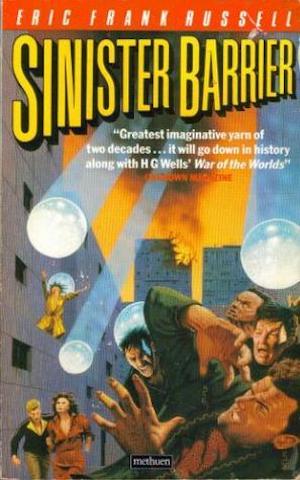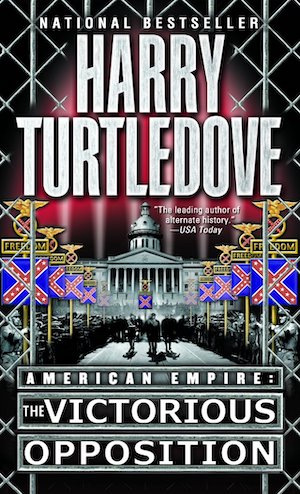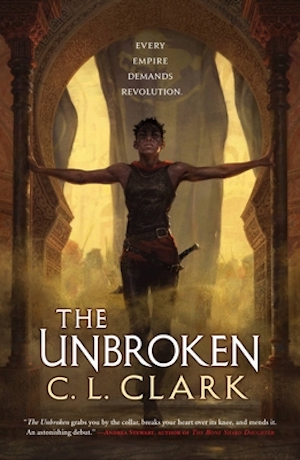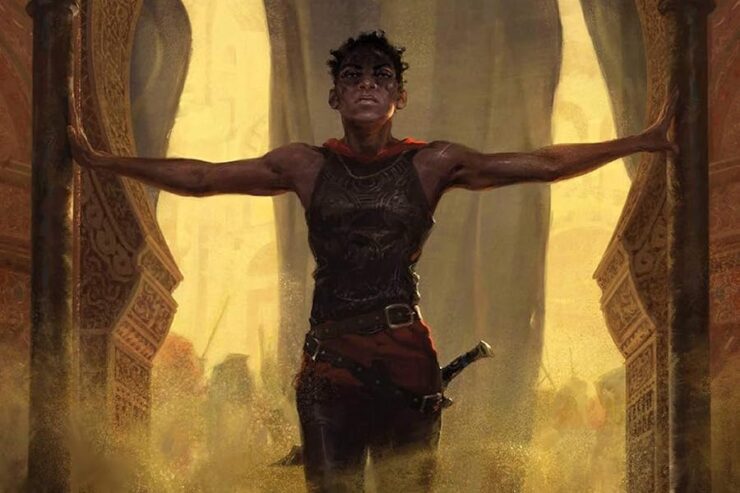Everyone likes to cheer for the underdog, particularly in military conflicts. This presents a challenge for speculative fiction authors. On the one hand, writing about the little guy somehow overcoming tremendous odds is a crowd-pleaser. On the other hand, the underdog is an underdog for a reason. If overwhelming military force worked so well in places like Vietnam, Somalia, and Iraq, how could it fail in the author’s fictional universe?
Here are five answers to that question.
Sinister Barrier by Eric Frank Russell (1939)

Americans in the unimaginably futuristic year of 2015 are doing a dismal job of resisting their overlords. This isn’t due to some inherent flaw in the American character. Rather, it’s because Americans in particular and humanity in general have no idea that they have overlords.
Liaison officer Bill Graham is convinced that the recent wave of deaths amongst America’s top geniuses is being orchestrated by some unknown agency. Graham is astounded1 to discover that the culprit is no internal enemy nor foreign foe. The immaterial, invisible Vitons have long controlled humanity, the better to feed off humans. The scientists knew too much and had to die. Now Graham too must die, along with everyone with whom he has shared the secret of the Vitons. Which, thanks to mass media, is a lot of people.
Sinister Barrier is an example of Fortean fiction, a subgenre that seems to have fallen out of favor. In particular, it’s an exploration of the proposition that humans are property, which seems like the sort of central concept that might find ready audiences these days. Be aware, however, that the novel is also an example of how badly certain elements of olden time SF can age.
Spoiler: the resistance wins, but I’m not going to tell you how.
The Word for World is Forest by Ursula Le Guin (1972)

For overcrowded, resource-depleted Earth, New Tahiti is a godsend, a perfect world for Terran colonists like Captain Davidson to exploit. New Tahiti is an untouched paradise. Its forests cry out for clear-cutting. True, the natives aren’t good for much, not even slavery, but no doubt some Final Solution will present itself.
From the Athshean perspective, matters are considerably grimmer. Aliens have invaded Athshe, renamed it New Tahiti, displaced and enslaved the Athsheans, and are seemingly intent on obliterating the forests. Diminutive, lacking the Terrans’ sophisticated mechanical arts, the Athsheans seem doomed. In fact, salvation is within the Athshean grasp… if they are willing to pay the price.
The Athsheans have an asset they are poorly situated to fully appreciate. Athshe is twenty-seven light-years from Earth in a universe where crewed starflight is sublight. The vast, powerful military-industrial complex on which the thoroughly reprehensible Davidson depends is at the other end of a very long logistical chain.
Red Dawn (1984), dir. by John Milius, written by Milius and Kevin Reynolds
World War Three having developed not necessarily to the United States’ advantage2, Calumet, Colorado finds itself swarmed by Red Communists backed and armed by Soviet Russia. The heavily-armed invaders massacre anyone foolish enough to resist. Calumet is occupied territory.
In the chaos of the invasion, a small group of high school students managed to elude the invaders. Poorly armed compared to the occupying army, the students lack suitable expertise to carry out a guerilla war. Nevertheless, the Wolverines are determined to make the invaders regret targeting Calumet.
To be honest, the Wolverines don’t make a strong case that an assortment of poorly-armed American high school students would be an effective guerilla force. “WOLVERINES FUCK YEAH” loses to “reality ensues”3. But sometimes, winning isn’t the point.
American Empire: The Victorious Opposition by Harry Turtledove (2003)

Although the US lost the states comprising the Confederate States of America, the republic did manage to conquer Canada. Quebec was then spun off into its own republic, theoretically independent from but dependent on the US. The rest of Canada was occupied.
Enter heroic Mary Pomeroy, whose family lost two members thanks to the US invasion. In general, the US has done a spectacularly awful job4 of integrating Anglo Canada into the US. In the case of Mary, nothing the US can do will ever compensate her for her loss. Thus, Mary’s mail-bomb campaign.
Canadian national mythology has at its core thrilling tales of how we fended off previous US invasions, burned the White House5, and how the Geneva Convention was inspired in part by a desire to get Canadians to moderate their enthusiasm for war crimes6. Campaigns like Mary’s would seem to be an inevitable reaction to a US invasion and occupation in some quarters. Imagine the Iraq resistance, as conducted by people who can travel freely through the US while passing as Americans.
The Unbroken by C.L. Clark (2021)

Balladair has a simple formula for success: crush weaker nations, occupy them, and send those children who might otherwise form a resistance off to be indoctrinated as loyal (and very expendable) soldiers in service of Balladair. It is in all respects an infallible plan, except for the part where it does not work.
Touraine and her fellow conscripts are dispatched to Touraine’s birth country Qazāl. Their mission? To suppress a rebellion. The actual outcome? To drive home to Touraine how little Balladair values the lives of Touraine and her fellow conscripts and how useful Touraine’s skills could be in the hands of Qazāl’s freedom fighters.
Readers might wonder if it’s a bad idea to kidnap someone, provide them with military training, and then send them back to the very nation from which they were kidnapped. It is. It’s a tribute to Balladair’s self-confidence that its rulers think this little plan is going to work out the way they expect.
Science fiction and fantasy love plucky resistance stories—the above are only a few of the many examples I could have selected. No doubt I missed some favorites. Feel free to remind us of them in comments below.
- But only because Sinister Barrier was published in 1939. Had it been published after October 1960, Graham would have been analoged.
- More alarmingly from my perspective, British Columbia was also occupied (see the map reflecting the events of the movie), thus imperiling the national Nanaimo bar supply.
- At least the Wolverines do better than the German teen soldiers in 1959’s Die Brücke, whose misguided efforts to needlessly defend a strategically unimportant bridge from well-equipped, skilled American soldiers goes extremely badly. On the plus side, the kids were Nazis (or at least fighting for the Nazis).
- Even more astonishing, the US occupation of Utah is somehow even more ineptly managed than the occupation of Canada, with some Mormons turning to suicide bombing. Given that the US historically rebounded from their less-than-entirely successful Utah War to successfully integrate Utah into the US, this version of the US seems to have lost crucial administrative skills.
- Which Canadians didn’t. That was the British. We did blow up our own fortifications to confound the Yanks. As the schoolyard joke goes, “What was the last thing that went through Zebulon Pike’s mind?” “The York armory.”
- Many Canadians really do believe the Geneva Convention thing. I know this because three different Canadians have mentioned it to me since January 20th in positively gleeful tones. However, Canadian national mythology is not all self-aggrandizement and reveling in violence. Our mythology enshrines the idea that the return on investment of privateer-based American gold acquisition was grossly overstated, leaving investors wishing they were in Sherbrooke now. (I understand and accept that many American readers won’t get the reference or understand why a number of Canadians are conditioned to respond to it with a four-word vulgarity and I am OK with that.)











Red Dawn hit cable while I was in Army AIT at Ft. Gordon in Georgia and it was the funniest damn movie. Even as barely trained as we were we could see how pathetic the “Wolverines” were. Even the National Guard troops in training with us laughed.
In the original Red Dawn’s defense, embracing badly thought-out plans and ineffective methods leads to an almost total party kill, rather than it all somehow working out because the script-writers were on the protagonist’s side.
The four word vulgarity would be “God damn them all”?
Exactly! Your complimentary double double and Canada goose.
And not just Canadians…. i live in a border state, and you mean there’s a different response?
I’m afraid ol’ Bill Graham would have been neither astounded nor analoged — he would have been unknown … ;)
Beat me to it! : )
though if published a couple of years later, he would have ended up in an unknown world.
“Readers might wonder if it’s a bad idea to kidnap someone, provide them with military training, and then send them back to the very nation from which they were kidnapped.”
Except that’s basically how the janissaries worked in the Ottoman Empire. They were taken as children, indoctrinated and strictly disciplined to instill loyalty to the empire, and eventually, once they rose high enough through the ranks, sent back to their home regions as administrators. The idea was to have administrators who’d understand and be accepted by the ruled populations (because they were part of them) but would still be strictly loyal to the empire. After all, their home communities would be long-ago childhood memories, and presumably those recruits who weren’t sufficiently loyal wouldn’t get picked as administrators. The janissaries did revolt from time to time, but not so much out of loyalty to their home nations as out of a sense of the janissaries’ own importance and prestige as a military elite.
I often hear people say “It doesn’t make sense to enslave/oppress people but teach them to be soldiers who can fight back,” but that’s actually an extremely common practice throughout history, since slave soldiers are considered more expendable. (And not just slaves, but colonized populations such as the Indians made to fight for the British Empire.) Although in the Ottoman Empire, everyone was considered a slave of the state, and slave soldiers that conquered new lands could rule them and found their own dynasties while still nominally being slaves.
I should apologize for suggesting this one: Wielding a Red Sword, by Piers Anthony (1987). After Mars, the Incarnation of War, is sent to Hell, he raises a revolution of damned souls. Can’t get much further “underground” than that.
I believe Barry Longyear’s Circus World stories had one where the hereditary circus folk were fighting off invaders- using their clowning and acrobatic skills.
Sounds vaguely like the Star Trek novel “How Much For Just the Planet” where the natives put on a show to confound both the Klingons, and the Enterprise.
Rebels are we!
Born to be free!
Like the fish in the sea!
Diane Keaton, strumming her guitar in Woody Allen’s SLEEPER.
I am rather surprised that you don’t mention Heinlein’s “If This Goes On…”. The more so as the resistance movement fighting the theocracy ruling a future America is literally an underground one since it is headquartered in a vast cave complex.
Honestly, it just slipped my mind, even though I just replaced my disintegrating copy of The Past Through Tomorrow.
Yeah, but that particular Heinlein is so old as to be completely irrelevant today. I mean, really, what is the chance of the US being taken over by a religious/authoritarian group that completely withdraws the US from the world?
The Shrouded Planet and The Dawning Light duology by Randall Garrett is a possibility. But who’s the hero and who’s the villain in that one?
No The Moon is a Harsh Mistress?
Are there, James, five SFF works exploring the USA invading her nice northern neighbour that you haven’t included in a Five Books yet?
I’m envisioning something like ‘Five Books that prove bullying your best friend is “a very dumb thing to do.”’
Aside from the Turtledove and Rohmer’s Exxoneration, I’m having a hard time thinking of fictional examples where the invasion is on stage. Lots of stories where Canada has been annexed into the North American Union but those tend to be short on details.
I can see why there might be a dearth of stories about invading Canada by Americans, as it might not be apparent to an American author that Canada does not want to be part of the US. Some may think it already is [1]. However, there are lots of Canadian authors who would be perfectly aware of and exemplify Canadian sentiment in this matter. Canada has been invaded from the US over and over, paranoia about US invasions inspired Confederation. There have to be Canadian analogs of The Battle of Dorking. No doubt I will think of them at 3 AM.
Arthur Hailey’s In High Places is an edge case, because the President isn’t threatening to invade. He thinks nuclear war is inevitable and if Canada does not join the US, the US will embrace a defense strategy that could lead to Soviet warheads detonating over Canada. Oh, and there’s a John Barnes that’s also an edge case because the US does not invade as such, they just murder everyone in Canada for preventing WWIII.
Oddly, I can think of stories where Canada either facilitates invasion of the US (the backstory to Card’s Hot Sleep) and ones where we liberate parts of the US (Systemic Shock, and all those Americans were dead when we got there). Or where the US is invaded but Canada isn’t (I, Martha Adams and I think The Takeover).
There was an old radio show called Nazi Eyes on Canada, which dramatized the consequences should Nazi Germany defeat and occupy Canada. Not the US but it is about an invasion or at least the immediate aftermath. Had some big name actors, too: Orson Welles, Vincent Price, Helen Hayes, and Lorne Greene, among others. It’s on archive dot org but be aware it’s rather grim.
Oh, and in the 1970s there was a terrible CBC radio play about Japan taking over Canada. Not via military means but economic. All I remember now is a line something like “Canada was run by the French, and then the English, and then the Americans, and we of Japan simply feel it’s our turn.”
1: I am at a loss to understand the US author who was utterly unshakably convinced Quebec was Vichy in WWII. Do they not teach anything about the Plains of Abraham anymore?
Didn’t this author hear of something called the “French & Indian War?” which is, of course, the local (US) name for the Seven Years War, which took place over just about the entire world.
As for invading Canada, I know the US tried (and failed rather abjectly) at least twice. I think any US leader who advocates a third invasion should consider some more useful idea, like self-immolation.
Brian K. Vaughan wrote a graphic novel called We Stand on Guard about 10 years ago that basically took the premise “What if Canada was Iraq?” with predictable results.
Clive Cussler wrote “Night Train” where during WW1 the UK sold Canada to the US, and the US decides to collect.
Based on my experience working with USAians, I don’t believe the majority of them understand that Canada has a history, epic or otherwise.
(Merci for your brief survey of cross border literature. You’re right to point out that most of these tales just present the annexation of The True North as a fait accompli.)
Of course, Anglo Canadians have, IMHO, a less than rudimentary understanding of the histories of Les Canadiens. Nor do we appreciate the oral histories of the First Nations, Inuit, or Métis.
(Waves his cane at the clouds)
Lois McMaster Bujold, _Komarr_, where a group of Komarran engineers invent a device that should let them bloodlessly remove the Barrayaran occupiers from their planets. In Campbell’s Analog era, this would have worked perfectly. Alas, there are some factors that the plucky engineers have failed to consider…
Though even in the Campbell era, doing it against the interest of the protagonist radically reduces one’s chances.
(Though somewhat to my surprise, none of Poul Anderson’s Flandry stories seem to have appeared in Astounding/Analog, so maybe I’m wrong.)
Readers might wonder if it’s a bad idea to kidnap someone, provide them with military training, and then send them back to the very nation from which they were kidnapped. It is.
I’m reminded of how perfidious Albion reared an Irish Chieftain – Hugh O’Neill – to be an English Gentlemen in the hopes he’d end up a loyal citizen of the crown. This was in the reign of Elizabeth I. Later, back in his home province, he ordered a large quantity of lead from the British Government, ostensibly to fix his roof (it was for bullets).
The Word for World is a wonderful fable, but the economics of how it’s supposed to work make my head hurt.
I’ve read some enjoyably wild justifications of the lamentable energy budget of an interplanetary trade in just about anything, but I enjoy the vision of interplanetary spaceships crammed with ordinary lumber.
At least Avatar had unobtanium!
Historically, a lot of international trade was driven by luxury goods whose value was in their exotic origin rather than their practical use, things like spices, textiles, pottery, and the like. It would’ve been cheaper to manufacture the equivalent at home, but it was the appetites of the wealthy that drove the trade, so the inefficiency of it was kind of the point.
In my Analog story “Twilight’s Captives,” the interstellar trading community known to humans as the Nocturne League (since its main species are nocturnal) traffics largely in similar sorts of goods, things that are considered valuable because they’re genuinely of alien origin rather than replicated from transmitted data. The League also deals in the services of skilled personnel, people who are valuable for their experience, talent, and insight. These things alone wouldn’t entirely justify the expense of interstellar trade, but the founding Nocturne culture was somewhat inspired by my studies of the diplomatic value that was ascribed to trade in Imperial China and indigenous North American cultures, where it’s not so much about profit as about maintaining good relations with other states, to the point that sometimes the goal is to ensure that the other party profits more than you do. (Imperial China prided itself on giving more than it got, as an illustration of its superior wealth and power.)
High value goods were the dominant item of long distance international (and overseas) trade, but the Roman Empire relied on shipment of grain from Egypt to Rome, and the UK transported lumber for masts from Scandinavia.
Of course, long-distance transport by sea has been relatively cheap for centuries, and it was only after the invention of the railroad that overland transport became economically competitive. IIRC, it cost more to transport grain from Ostia to Rome than from Egypt to Ostia.
I wouldn’t bet on that (having just been in Ostia Antica and seen how good the roads were) — but I wouldn’t bet against it; ISTR shipping a pallet of NESFA Press books to a Glasgow Worldcon and discovering that the cost of trucking from Boston to Newark was less than the cost of sea freight from Newark to the southern UK.
David Brin’s The Uplift War comes to mind…
You know, I had an amusing comment I was 20 words into when I realized that could be a whole essay if I just expanded it to 800 words.
See also Chicago Red (1990) by R.M. Meluch. Set a couple of hundred years after catastrophic climate change, the USA has become a monarchy, with technology at about 1890 – 1910 level, the title is the nom de guerre of the resistance leader attempting to break the absolutist rule. I think it may also be one of the earliest full-length novels to treat what was then called “global warming” as resulting in a degraded post-apocalyptic society.
Since Red Dawn was mentioned, a shout out to the Australian movie Tomorrow, when the War Began (2010). Same themes. netter execution than either of the Red Dawns.